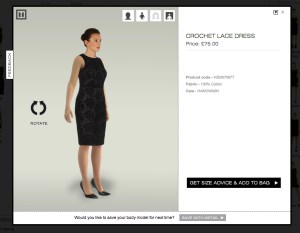Likened to a space race, there are a whole bunch of startups trying to solve the problem of how to ‘try on’ clothes online. And for the online fashion industry, it’s a big problem, too. The inability to see if a garment actually fits before making a purchase, not only lowers conversion rates, but is also seeing return rates as high as 70%, an expense that online retailers can ill afford. Arguably, however, no one has landed on the moon, quite yet, and the virtual fitting room market is still wide open.
One startup that thinks it’s well-positioned to do so is the UK’s Metail, which launched a partnership with Warehouse (owned by the Aurora Fashions Group) last week, following a successful trial of its virtual fitting room solution with retailer, Tesco. We’re also hearing that a commercial trial with Rocket Internet’s Zalando in Germany could be announced as early as tomorrow, signaling Metail’s first International customer, while closer to home it’s added another client in the form of Shop Direct. That’s a pretty impressive roster for a startup that, I’m guessing, you probably haven’t heard of.
Metail’s purposely been flying under the tech press radar, says CEO and co-founder, Tom Adeyoola, and has effectively been operating in “stealth mode” since it was founded in January 2008. Rather than courting PR, the company has been concentrating on building relationships across the fashion retail industry and developing its technology.
“We’ve not wanted to make bold claims or over-hype expectations about our product in the meantime”, he says.
 That product is a virtual fitting room based on Metail’s 3D visualisation technology, which enables a clothes shopper to upload a photo and dial in a few basic measurements to create a virtual representation of themselves (a ‘MeModel’) so that they can ‘try on’ garments virtually. It’s an approach which, on the surface, is attempting to be simpler than competitors, but under the hood is no mean feat.
That product is a virtual fitting room based on Metail’s 3D visualisation technology, which enables a clothes shopper to upload a photo and dial in a few basic measurements to create a virtual representation of themselves (a ‘MeModel’) so that they can ‘try on’ garments virtually. It’s an approach which, on the surface, is attempting to be simpler than competitors, but under the hood is no mean feat.
“We’re the only people in the world who allow you to build accurate 3D versions of yourself from basic information and a photo”, claims Adeyoola. “Metail’s competitors offer expensive robotic mannequins, web measurement tools and dress-up dolls but none have the “wow” factor that comes with creating a virtual you, with dress size and fit information so personally tailored.”
To pull this off, Metail doesn’t rely on CGI. Instead, each garment is professionally photographed and digitised so that they look “exactly” as they do in-store, surfacing “every wrinkle, pleat and fold”. However, getting that process to scale is quite an undertaking.
“One of the company’s key challenges has been to design a fast, cheap method of stocking the online fitting room with clothes. This means photographing garments and turning them into 3D digital images ready for customers to add to their MeModels”, says Adeyoola.
Along with those claims, Metail’s team (on paper, at least) is equally impressive. Chief Scientist and co-founder is Duncan Robertson. Following a Ph.D in Computer Vision at Cambridge University, he founded Redimension Ltd, a consultancy focused on solving specialist computer vision problems for the likes of Microsoft and Samsung. This included being involved in Microsoft Research’s work on the Kinect. Meanwhile, Adeyoola himself is an Economics graduate from Cambridge, and has a career that spans a number of positions in the technology industry, most recently as Head of Gaming at Inspired Gaming Group. Overall, the company’s headcount is at around 27 and features 5 Ph.Ds. Its offices are split between London’s Silicon Roundabout and an R&D-focussed base in Cambridge, UK.
Interestingly, for a startup that has, until now, remained so stealthy, Metail has raised a decent £2.7 million, though this doesn’t include any institutional funding, as such. Investment came initially via a ‘friends and family’ round in October 2008, followed by funding from a number of Angel investors in March 2010. In addition, Metail recently won a TSB R&D grant and has received R&D tax credits.
“We will shortly be looking to raise our first institutional round to scale the business”, says Adeyoola.
To that end, the company is already generating revenue from those retailer partnerships (it makes money on every purchase that comes via its virtual fitting room), while in terms of scale, a user only has to create their MeModel once as it’s portable across supporting sites.
Metail’s competitors already include the likes of TrueFit, MyShape, Clotheshorse, True & Co., Fitiquette, and Fits.me — and Adeyoola acknowledges that the company has yet to completely solve the virtual fitting room problem.
“We focused on the least sexy part and asked ourselves ‘how do we get the digital photography cost down so we never have to charge retailers for it?'”, he says. “The research and development team is working 15 months ahead on our version of digital photography so we can fully automate our 3D garment models.”
